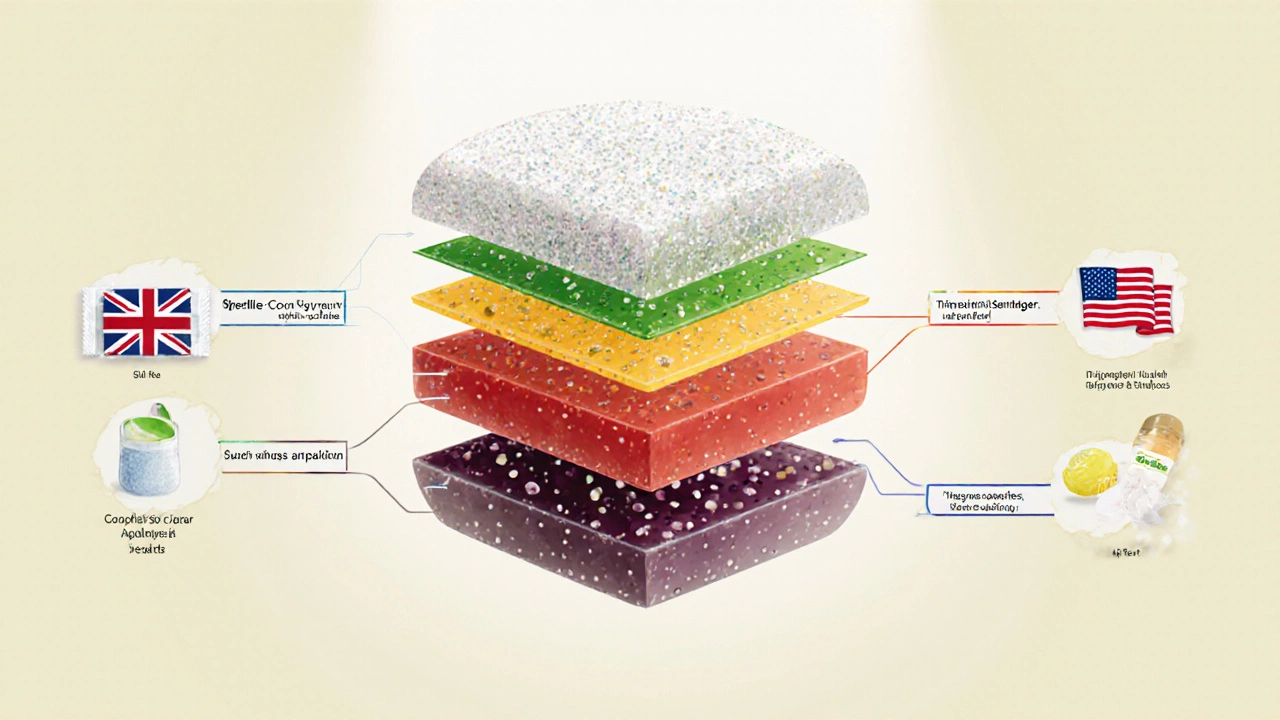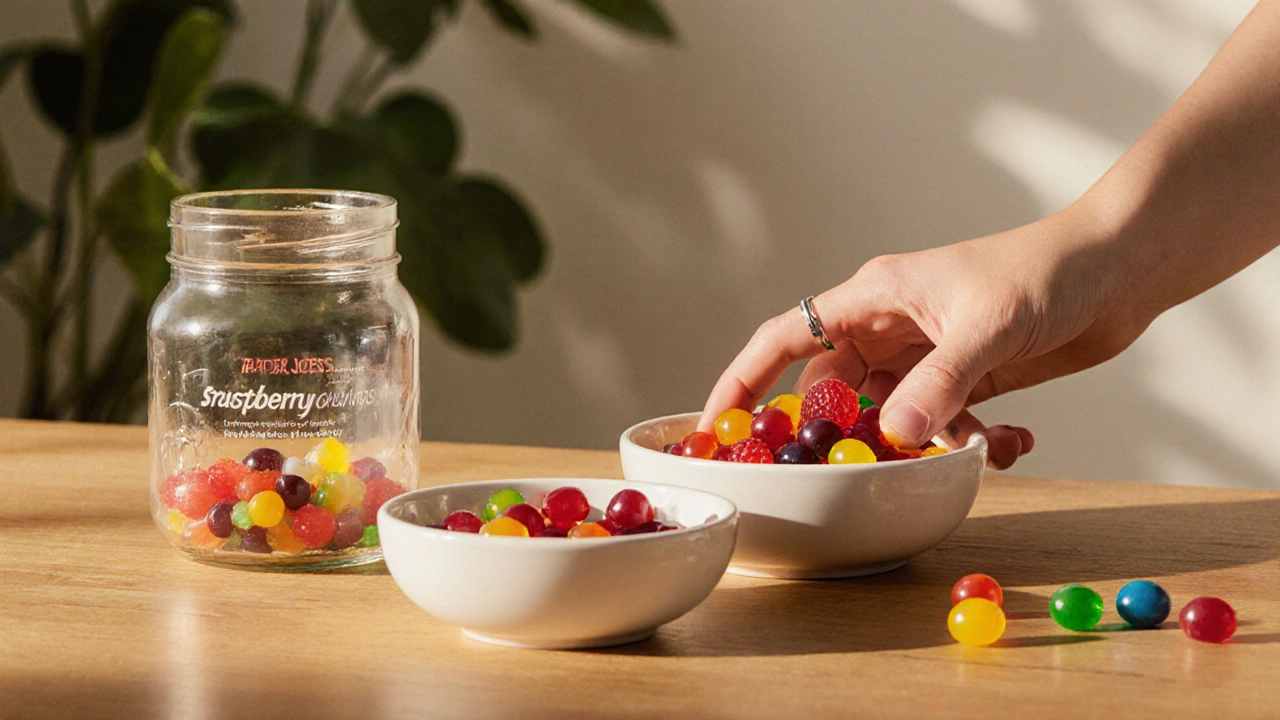
Skittles Vegan Checker
Click "Check Vegan Status" to see if Skittles meet your vegan requirements based on selected region and year.
Important Notes
- Skittles are gelatin-free and use vegan-compatible colors.
- "Natural flavors" and "brewing yeast extract" are debated among strict vegans.
- Some regions use different additives (e.g., beet-derived red in UK vs synthetic red in US).
Trying to decide if a handful of Skittles vegan fits into your plant‑based diet? You’re not alone. The bright rainbow of these chewy sweets looks harmless, but the ingredients list can hide animal‑derived surprises. This guide breaks down what’s inside a standard Skittles packet, how labeling differs across the UK, US and EU, and what you can reach for if you need a truly cruelty‑free treat.
What exactly are Skittles?
When most people think of Skittles, they picture tiny sugar shells in six vivid colors. Skittles is a fruit‑flavored candy produced by Mars, Inc. that has been on the market since the 1970s. The brand is owned by the global confectionery giant Mars, Inc., which also makes M&M’s, Snickers and Twix.
Defining “vegan” in the candy world
Vegan food contains no animal flesh, milk, eggs, honey, gelatin or any other ingredient derived from animals. Vegan means free from animal products and not tested on animals. For candy, the trick is spotting hidden animal‑based additives such as gelatin, carmine, or certain “natural flavors”.
Ingredient checklist - UK and US versions (2025)
Below is a line‑by‑line look at the components most commonly found in Skittles sold in the United Kingdom and the United States. The list reflects the 2025 packaging, which is the most recent update from Mars.
- Sugar: the primary sweetener. In the UK, sugar often comes from beet; in the US, from cane. Both are plant‑based.
- Corn syrup: a liquid sweetener derived from corn, completely vegan.
- Hydrogenated palm oil: a plant‑derived fat used to give the candy a smooth mouthfeel.
- Brewing yeast extract: adds a subtle umami note; technically vegan, though some vegans avoid it due to the brewing process.
- Citric acid: a fruit‑derived acid for tartness.
- Natural flavors: a catch‑all term. In Skittles, these are typically derived from plant sources, but the exact origin is not disclosed on the label.
- Colors (E100‑E162): the rainbow is achieved with a mix of synthetic and natural pigments. Notably, carmine (E120) - an insect‑derived red dye - is **not** used in Skittles; the red comes from beet‑derived or synthetic alternatives, which are vegan.
- Gelatin: *not* present. Skittles use a pectin‑based coating, making them gelatin‑free.
From this list, there are no outright animal‑derived ingredients. However, the vague “natural flavors” and the source of certain colors can be a gray area for strict vegans.

Why the label can still be confusing
Even though the printed ingredients don’t mention animal products, two factors keep vegans cautious:
- Supply‑chain opacity: Manufacturers sometimes source flavor compounds from animal‑based processes without indicating it on the label.
- Cross‑contamination risk: Production lines that also handle gelatin or dairy products can lead to trace amounts, which some vegans consider unacceptable.
In the United Kingdom, the Food Standards Agency (FSA) requires allergens to be highlighted, but it does not mandate a vegan certification. In the United States, the USDA does not have a standard vegan label either, leaving the responsibility to third‑party certifications like the Vegan Society or Vegan Action.
How to verify vegan status yourself
When you’re at the shop, follow this quick checklist:
- Look for a certified vegan logo (Vegan Society, Vegan Action, etc.). Skittles currently do not carry one.
- Read the full ingredients list for gelatin, carmine, or whey.
- Check the “Allergy Information” box - many brands list “contains milk” or “may contain traces of gelatin”. Skittles usually note “may contain traces of soy” but not dairy or gelatin.
- Visit the brand’s official website. Mars, Inc. publishes FAQs where they confirm that Skittles are gelatin‑free and do not contain animal‑derived colors.
- Contact customer service. An email to Mars’s UK support usually receives a response within 48hours confirming the vegan status of specific batches.
Regional differences - EU vs US formulations
In the European Union, food additive codes are stricter. Skittles sold in EU countries use E‑numbers for colors (E100, E133, etc.) that are approved for vegans. The US version lists the same colors but sometimes uses the trade names (e.g., “Red 40”). Both comply with vegan standards, but the EU label is more transparent about the additive numbers.
One nuance: the UK version of Skittles switched to beet‑derived red in 2023 after consumer pressure, whereas the US kept the synthetic red dye (Red 40) which is also vegan. So, regardless of geography, the candy remains free of animal‑derived pigments.

Vegan alternatives that taste similar
If you still feel uneasy about the “natural flavors” ambiguity, here are three certified‑vegan candies that mimic Skittles’ sweet‑tart profile:
| Brand | Key Ingredients | Vegan Certification | Price (UK, per 100g) |
|---|---|---|---|
| Trader Joe’s Fruit Snacks | Sugar, corn syrup, fruit juice, pectin | Vegan Society logo | £1.30 |
| SmartSweets Raspberry Gummies | Organic tapioca syrup, juice powder, pectin | Certified Vegan | £2.20 |
| Project 7 Vegan Fruit Gummies | Coconut oil, fruit puree, agar‑agar | Vegan Action Certified | £1.90 |
All three alternatives are free from ambiguous “natural flavors” and carry a clear vegan seal, making them a safe bet if you want 100% certainty.
Tips for staying vegan while still enjoying candy
- Read labels every time - recipes change, and new batch codes can alter ingredients.
- Keep a list of trusted vegan brands in your phone for quick reference.
- Check online vegan forums; community members often post the latest batch information for popular candies.
- Buy in bulk from certified vegan distributors to reduce the chance of accidental cross‑contamination.
- When in doubt, opt for fruit‑based snacks like dried mango or organic fruit leathers, which are naturally vegan.
Bottom line - Are Skittles vegan?
Based on the 2025 ingredient lists for the UK, US and EU markets, Skittles contain no direct animal‑derived components. The candy is gelatin‑free, uses vegan‑compatible colors, and does not list dairy or honey. The remaining uncertainty lies in the unspecified “natural flavors” and possible cross‑contamination on shared production lines. For most flexitarian vegans, Skittles are acceptable, but strict vegans who avoid any ambiguity may prefer a certified‑vegan alternative.
Frequently Asked Questions
Do Skittles contain gelatin?
No. Skittles use a pectin‑based coating instead of gelatin, making them gelatin‑free.
Are the colors in Skittles animal‑derived?
The red color is derived from beet or synthetic dyes, not carmine. All listed colors are approved for vegan use in the EU and US.
What does “natural flavors” mean on the label?
It’s a catch‑all term for flavor compounds extracted from plant sources, but manufacturers don’t disclose the exact origin. Mars states they are plant‑based, but the lack of detail can be unsettling for strict vegans.
Is there a vegan certification for Skittles?
No official vegan logo appears on Skittles packaging. The brand relies on ingredient transparency rather than third‑party certification.
Can I trust the UK version of Skittles more than the US version?
Both versions are vegan‑compatible. The UK label provides European E‑number codes, which are a bit more transparent about additives, but the actual ingredients are essentially the same.
What are some certified vegan candy alternatives?
Brands like TraderJoe’s Fruit Snacks, SmartSweets, and Project7 offer gummy candies with clear vegan certification and similar sweet‑tart flavor profiles.